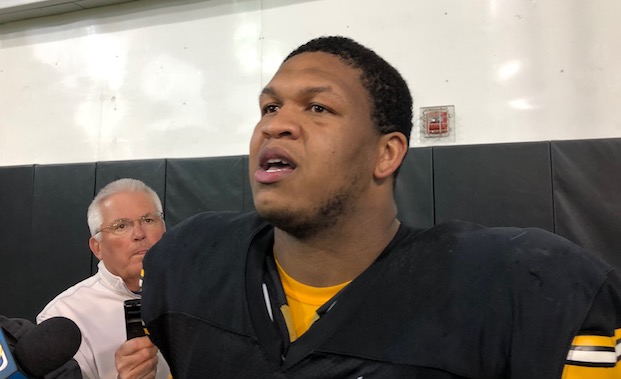The worst part about covering the Iowa football team unfortunately showed up on Saturday
By Pat Harty
IOWA CITY, Iowa – The worst thing by far about covering the Iowa football team, or any team for that matter, is watching a player suffer an injury.
The pain, the fear and the uncertainty that comes with being injured creates a horrible circumstance that often has lingering effects.
Iowa offensive lineman Alaric Jackson is dealing with that sobering reality right now in the wake of having suffered a knee injury in the first half of Saturday’s 38-14 victory over Miami of Ohio in the season opener at Kinnick Stadium.
The sellout crowd fell eerily silent as Iowa’s medical staff examined the 6-foot-6, 320-pound Jackson on the field.
There was a brief moment of hope when Jackson jogged off the field, but it was short-lived as he didn’t return to the game and then left the field on crutches.
“Nothing right now,” Iowa coach Kirk Ferentz said about Jackson’s status after the game. “But we’ll probably know more next time we get together on Tuesday. We’ll keep our fingers crossed.”
It is devastating when any player gets injured, but Jackson is one of Iowa’s marquee players and is considered a top NFL prospect as a fourth-year junior.
He has worked for countless hours to be in this position, but then in a matter of seconds that work gets put on hold and gives way to a different kind of emotional grind and challenge.
There is always the chance that Jackson’s injury isn’t serious, but so often the news isn’t good when it involves a knee.
The biggest fear is that Jackson has suffered ligament damage and will miss the remainder of a season that has just started.
He and fellow junior Tristan Wirfs form what is considered arguably the top offensive tackle duo in the Big Ten, and potentially one of the best to play for Iowa in quite some time.
Jackson, as Iowa's starting left tackle, also has the massive responsibility of protecting quarterback Nate Stanley’s blindside.
Wirfs will assume that responsibility if Jackson can’t play by switching from right tackle to left tackle as he did in Saturday’s victory over Miami of Ohio.
Iowa overcame Jackson’s absence on Saturday to rush for 213 yards, but the level of competition, no disrespect to Miami of Ohio, will improve dramatically as the season progresses.
Iowa needs Jackson healthy and playing to be at full strength on the offensive line, but sadly overcoming injuries is a reality for any football team.
There is a reason Jackson has started at left tackle since he was a redshirt freshman, actually there are lots of reasons.
The Detroit native is big and strong and agile enough to have once thought that basketball might be his avenue to success beyond high school.
But Jackson ultimately chose football, and it’s easy to see why with him now emerging as a star for the Hawkeyes. He made second-team All-Big Ten last season and had avoided injuries until something went wrong on Saturday.
Injuries don't discriminate in that even the best players are at risk of getting hurt, and all it takes is one unfortunate play for it to happen.
Should Jackson's injury prove to be serious enough to end his junior season, he can take comfort in knowing that he is in good hands with the Iowa medical staff watching over him.
Jackson also has the luxury of playing for a head coach whose area of expertise is the offensive line and who cares dearly about his players beyond football.
That was apparent as Ferentz spoke briefly about Jackson’s injury in his post-game press conference. You could just hear the sadness and the concern in Ferentz’s voice as he addressed the injury.
The potential damage from losing a starting left tackle is immeasurable from a football standpoint, especially for a team like Iowa that relies heavily on its rushing attack and that has a right-handed quarterback who isn't very mobile in the 6-4, 243-pound Stanley.
Jackson’s responsibility is to protect Stanley’s blindside, and that is a daunting task at which he excelled until the injury occurred on Saturday.
But injuries go way beyond the potential damage that might occur to a team on the field. Injuries are devastating from an emotional and from a personal standpoint because they disrupt so many aspects of a player's life as a student-athlete.
You feel for Jackson’s family because they’re suffering, too, knowing that their loved one is hurting both physically and mentally.
The fact that Jackson’s injury occurred early in the season opener just adds to the misery because he was just getting started on a season that is filled with so much promise.
The good news is that knee injuries usually aren’t career-ending as they so often used to be.
My father and my older brother both had their college football careers cut short by knee injuries, with my father’s having occurred before he had even played in a game as a running back for Notre Dame in the mid-1940s.
Former Iowa linebacker Vernon Rollins also had his once-promising career cut short by a knee injury in 1997, but a lot has changed from a medical standpoint even since then.
Jackson could be faced with a long and grueling recovery process, but he won’t face it alone and the odds of making a full recovery are very good these days.
A football team is just like a big family, and Jackson will need that family to help him preserver and cope if the injury is serious.
All we can do right now is hope and pray for the best, and like Ferentz said, keep our fingers crossed.



